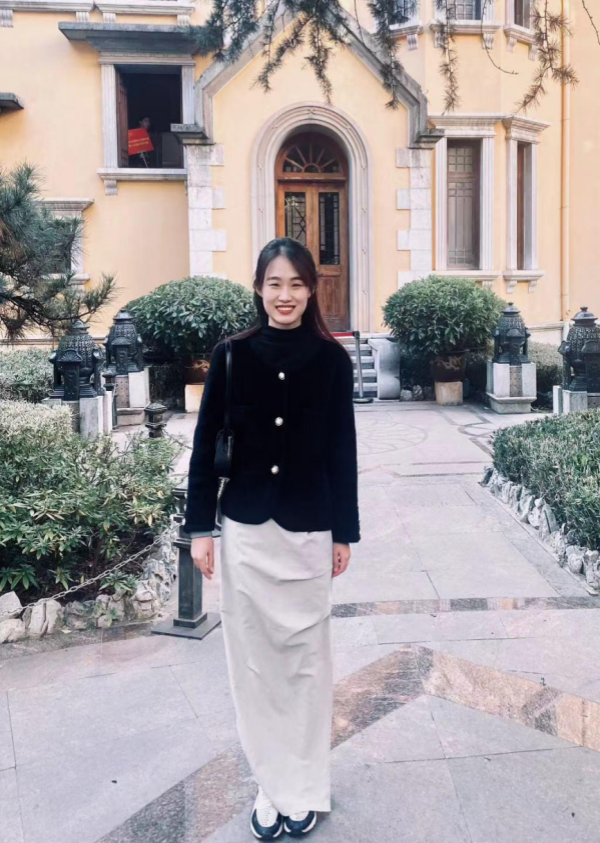BRI: Cultural Integration between Trip to Museum, Three Courses of Tea

Nguyen Pham Ha Vy from the School of Journalism at Yunnan University. [Photo/WeChat account of School of International Chinese Language Education, Yunnan University]
My name is Nguyen Pham Ha Vy and I am an international student from Vietnam. Setting foot in this land is like opening a new window for me. Here, I can not only study specialized knowledge, but also witness the major reforms and excellent achievements China has made in economic development, rural rejuvenation, technological innovation and traditional culture, all of which are closely linked with the Belt and Road Initiative (BRI).
Upon arrival in China, the skyscrapers of the prosperous cities, the bustling streets and advanced technological facilities gave me a glimpse of the booming development of China's economy and society. The thing that impresses me most is that China has not only made remarkable achievements domestically, but also actively worked with countries along the BRI to jointly seek regional economic prosperity and deepen cooperation in different sectors.
When participating in BRI-related exchange activities, I felt the in-depth integration between China and countries along the BRI in infrastructure construction, economic and trade interaction and cultural communications. For example, I visited a Sino-Vietnam cross-border railway project and saw firsthand how it promotes economic and trade contact and cultural exchanges between the two countries. I also participated in a Sino-Vietnam cultural exchange activity and found myself deeply attracted to traditional Chinese culture such as calligraphy, drawing and tea art. I visited the Yunnan Provincial Museum to explore its long history. Entering the museum feels like traversing the tunnel of time and space, and the dazzling exhibits immediately captured my attention: the ancient bronze and pottery and colorful ethnic costumes and handicrafts are all embodiments of the long history and unique culture of Yunnan. They are witnesses of past prosperity and reflect the vicissitudes of this land.
What made this museum tour unique was that it was not only a glimpse into history, but also the vivid practice of cultural exchange under the BRI framework. Coming from different countries, we gathered here out of passion and respect for culture. We appreciated the exhibits silently and discussed them intensely. Though different in language and customs, we shared some common views under cultural resonance. Such cultural communication has transcended the physical level and touched our hearts deeply. We also made local handicrafts, tasted local delicacies and watched ethnic singing and dancing performances. The thing that impressed me the most was the "Three-course Tea" of the Bai ethnic group.
In a typical Bai family, we were invited to experience three-course tea, a special tea-tasting rite with each course of tea having a unique taste and meaning. From bitter tea to sweet tea and sweet tea with an aftertaste, the tasting of tea is not only physically delightful but also very spiritual. When tasting tea, I felt not only the aroma of the tea, but also the friendliness and profound culture of the Bai people. "Three-course Tea" is not only a tea art performance, but also contains a life philosophy and cultural symbols. Through tea, Bai people convey the important values of facing difficulties, valuing happiness, self-reflection and adjusting life course. Such cultural exchange gave me deep insights and I treasured this opportunity very much.
Through the activity, I realized that the BRI is not only a roadmap for economic cooperation, but also a bridge connecting people. It strongly promotes exchanges and understanding among countries and deepens friendship and mutual trust. In the meantime, China's achievements in rural rejuvenation and technological innovation also impressed me deeply. When visiting a village in Chongqing, I witnessed the improved infrastructure, natural environment and living standards of farmers in rural areas. China's remarkable achievements in technological innovation are widely known to the world, whether it is 5G communication, AI or aerospace.
Participating in exchanges under the BRI framework allowed me to more deeply understand the development pattern of China and made me value friendship and cooperation with the Chinese people. I realized that the BRI not only brings infinite opportunities for China's economy, but also establishes a broad development stage and cooperation bridge for countries involved.
As an international student from Vietnam, I feel deeply honored to dedicate myself to this great initiative and to witness and experience the development achievements of China. In the future, I look forward to taking part in more BRI-related activities to share stories and experiences with my Chinese friends and jointly promote cooperative relations between China and Vietnam. In the meantime, I will bring back what I saw and experienced to Vietnam to teach more people about China and the BRI and jointly contribute to the construction of a community with a shared future for mankind.
All rights reserved. Presented by China Daily. 滇ICP备12004993号-2








